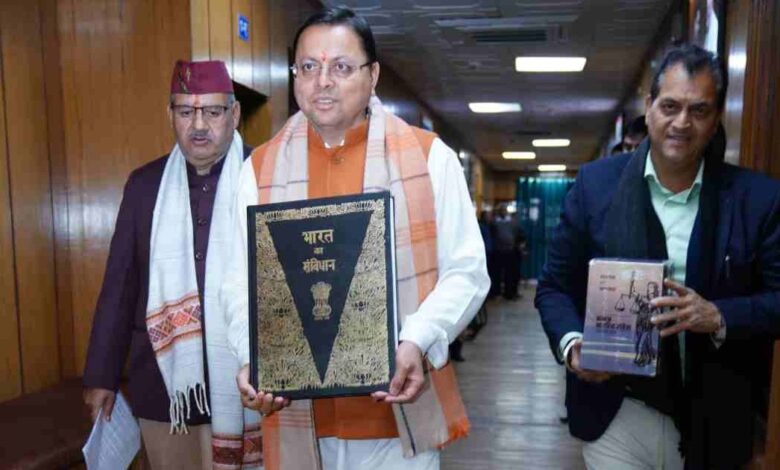UCC bill introduced in Uttarakhand, raises more questions than providing answers

UCC bill introduced in Uttarakhand, raises more questions than providing answers
S.M. A. KAZMI
Dehradun, Feb 6
Amidst slogans of ‘Jai Sri Ram’ and ‘Vande Matram’, the much touted bill on Uniform Civil Code (UCC) a long awaited promise of ‘Sangh Parivar’ was placed before the Uttarakhand Assembly by Chief Minister Pushkar Singh Dhami. The bill which promises to provide uniformity in marriage, divorce, succession and live-in relationships and matter related thereto raises more questions and adds to the confusion than providing any kind of ‘promised uniformity’.
The uniformity in the Uniform Civil Code, Uttarakhand, 2024 Bill lay in tatters in its preambles which states that the bill would not apply to members of the scheduled tribes. The question arises that If the bill is beneficial for all the citizens of the state, then why members belonging to the Scheduled Tribes have been deprived of this piece of legislation. The answer to this riddle lays in the political calculations of the ruling dispensation which did not want to annoy the Scheduled Tribes before the crucial Lok Sabha elections.
Some of the other salient features of the bill also raises questions about its applicability and legitimacy before the court of law. Interestingly, this code if passed and applied would “extend to whole state of Uttarakhand and also applies to the residents of Uttarakhand who resides outside the territories to which this code extends”. This could be problematic and would be in conflict with other applicable laws in other states and union territories of the country.
For instance, the bill proposes to make live-in relationships mandatory to be registered and failure to do so would bring legal action. Generally, most of the people particularly young conceal their live in relationships and would hesitate to come forward to get themselves registered in a register which would be open for public viewing. Would this fringe upon the privacy rights of the individuals? What the Uttarakhand residents living outside in such relationships do?
Similarly, the bill propose that marriages and divorces should be registered. Already there is provision for marriages to be registered but by making registration of divorces that too in public registers would again infringe upon personal and privacy rights.
The Bill as per ‘Sangh Parivar’ agenda targets minorities particularly the Muslims in the matters of marriage, divorce, re-marriage and succession. As per the provisions of the bill, more than one marriage is banned which would affect Muslim Personal Law which allows up to four marriages for a Muslim man. The bill also bans ‘Triple Talaaq’ which had already been banned under a central law passed by the Union government. The practice of ‘Iddat’ followed by Muslim women after divorce or death of their husband also stands repealed.
The age of marriage for girls is proposed at 18 and that of man at 21 years. These provisions are already there in the Hindu laws but in Muslims, puberty is the criterion for age of girls that is normally above 15 years.
The proposed UCC ignores the fact that most of the the issues related to marriage, divorce, re- marriage, adoption and succession are already covered by separate personal laws of Hindus, Muslims, Christians and Jews. It is an established norm that if the legislative space is already occupied by a central law that would override any other law passed by any state legislature on similar issues. All these issues are already covered under Hindu laws for Hindus and Muslim personal laws passed by the Parliament.
The Muslims would be affected in succession, marriage and remarriage as the UCC would infringe upon their personal laws. This clearly shows that it is only aimed targeting the minorities.
The ‘Sangh Parivar’ has wisely chosen Uttarakhand and its’ recent ‘Hindutva’ heart throb Chief Minister Pushkar Singh Dhami to float the ballon of Uniform Civil Code(UCC) in the latest ‘Hindutva’ laboratory of Uttarakhand and reap the political benefits in the coming Lok Sabha elections. Interestingly, the euphoria is being created in the name of UCC and attempts are being made to show that a long standing demand of the people of the country have been met by the ruling BJP.
The ruling ‘Sangh Parivar’ dispensation would also highlight the opposition by the Muslims against UCC as their ‘resistance’ for reforms and further lead to communal polarisation much to their political benefit in the long run. Already, Muslim community has started opposing the move and there are calls for knocking at the doors of the courts against the proposed UCC. Any court battle and resultant publicity by plaint media would also be to the advantage of the ruling dispensation.
In Uttarakhand, several Muslim groups and left parties have opposed the UCC. A group of Muslims led by senior New Delhi lawyer Mehmood Pracha protested and submitted a memorandum on behalf of the Muslim community while Syed Ashraf Hussain Qadri, state president of All India Muslim Jamaat in a statement said that Muslim community would oppose the UCC is it infringes upon Shariat laws as applicable to Muslims. Commenting on the penalties for not registering liv-in relationships, Indresh Maikhuri, state secretary, CPI(ML) said that it was attempt by the RSS to invade into the private lives of individuals as they do during ‘Valentine Day’. He called it as a waste of public money and resources.
Although, the Constitution of India talks of having a Uniform Civil Code (UCC) for the entire country, the attempt by ‘Sangh Parivar’ to float the ballon of UCC is an attempt to further polarise communally, reap political benefits and then test the waters for its’ nation wide implementation at a later stage.




